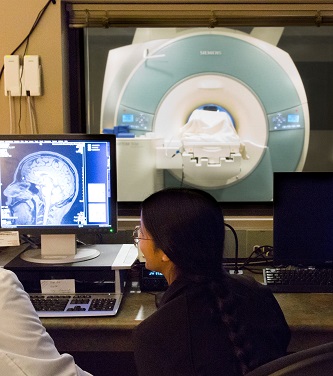Empathy Is a Cognitive, Not Sensory Experience, Says Psychology Professor Anjali Krishnan
Aug. 25, 2016

Assistant Professor Anjali Krishnan says this ground-breaking research on empathy could help scientists understand ways to improve human relationships.
Assistant Professor Anjali Krishnan of the Brooklyn College Department of Psychology, along with a group of researchers, has recently published a study that examines the neural basis of empathy. The National Institutes of Health (NIH)-funded study determined that empathizing and understanding the pain of others is not experienced as an instinctive, automatic process, but as one that requires deliberation.
"Empathy is an important aspect of human emotion," said Krishnan. "In this study, we have attempted to understand the neural differences between empathy for others' pain and experiencing pain in oneself."
The findings were published in the journal eLife on June 14.
The study involved observing brain activity in 10 female and 18 male volunteers as they experienced tolerable physical pain, and comparing those results to when they watched images of others being injured. While watching the images, volunteers were asked to try to imagine that the injuries were actually happening to themselves.
Krishnan and colleagues discovered that brain patterns differed for each type of pain experience, thus opening new possibilities for measuring brain activity as it relates to empathy.
"Most previous studies focused only on the points of similarity between these two distinct pain experiences in a few isolated brain regions, while ignoring dissimilarities," Krishnan noted. "Our study provides an unbiased estimate of the brain's response to these experiences."

Professor Krishnan in the laboratory observing a brain scan of one of the participants in her empathy study.
The results of the research may influence the way scientists explore the biological underpinnings of empathy, even in light of recent discoveries like the effect of a popular over-the-counter painkiller on empathetic responses. Further studies might identify other elements that factor into how human beings make decisions based on empathy.
"Knowing that we do not respond to others' pain as we do to our own gives us an insight into why we may systematically underestimate others' suffering," said Krishan. "This work uses a novel approach towards studying pain empathy, and the methodology can also be extended to compare empathy differences across groups e.g., cultural, clinical."
The study was conceived in 2011, when Krishnan joined as a post-doctoral research associate in the Cognitive and Affective Neuroscience Laboratory directed by Dr. Tor Wager at the University of Colorado at Boulder. She designed and executed the methodology and analysis specific to this paper, the first in a series of manuscripts to be published from the data.
Krishnan's co-authors on the research include Tor Wager (principal investigator); Choong-Wan Woo and Marina López-Solà of University of Colorado, Boulder; Luke Chang of Dartmouth College; Luka Ruzic of Duke University; Xiaosi Gu of the University of Texas at Dallas; Philip Jackson of Université Laval (Canada); Jesús Pujol of Hospital del Mar (Spain); and Jin Fan of Queens College of the City University of New York.






